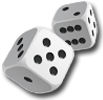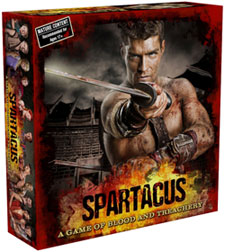



play board games
Board game reviews, strategy tips & session reports
Spartacus: A Game of Blood & Treachery Review
 Stats:
Stats:
No. of players: 3-4
Amount of time to play: 150 min
Age requirements: 17+
Set-up time: 5 – 10 minutes
Spartacus is a game based on the STARZ series of the same name. You must gain 12 Influence before your opponents do by out-scheming and out-fighting them.
Spartacus Description:
Each turn in Spartacus is broken into the following four phases, Upkeep, Intrigue, Market, and Arena. During the Upkeep Phase you get one gold for each slave but must pay one gold for each gladiator. This also the time when injured cards may get healed and exhausted cards are refreshed.
The Intrigue Phase allows each player to play Schemes from their hand. Each Scheme requires a certain amount of Influence to play and can help you or hurt others.
Next the Market Phase allows players to exchange or sell cards and then blind-bid on cards from the market deck. These tend to be new slaves, gladiators or equipment used in the arena. The last thing you bid on is who will host the Arena Phase.
The host invites two houses to put a gladiator into the arena. Then everyone may place wagers on the outcome of the fight. Combat is fairly straightforward. Each gladiator has three stats attack, defense and speed. Speed determines initiative and how far you can move. Once you roll your attack and your opponent rolls their defense you compare the dice in descending order. Each attacker’s die that is higher than the defender’s die is a hit. For each hit you take you remove a die from your pool. Once one of your stats has zero die you lose. If your opponent is able to reduce two of your pools to zero you are injured. Removing all of an opponent’s dice results in decapitation. The winning house gets one Influence and so does the host house. The host also determines if the loser lives or dies.
One other thing to note, most anything is negotiable and you do not have to be honest in your negotiations.
If any house has 12 Influence at the end of a Phase they win.
Quick Review of Spartacus:
I have never watched an episode of Spartacus but still enjoy this game. You might enjoy it more if you are a fan of the series, but knowing about the show is not necessary. The nature of this game is to play underhanded but just how nasty you play will depend on your game group.
The components for this game are excellent the figures, cards and board are all high quality. The rules may seem a bit thick, but that is because they are full of helpful examples.
Although it can run long, the game flows pretty quickly. The rounds tend to go by fast, but if you are not involved in combat the Arena Phase can drag a bit.
The auction is fun and the blind-bidding is one of the highlights of the game for me. My only complaint here is that sometimes the market does not yield things that are great to bid on. I wish there was a guarantee of getting at least one slave or gladiator in each auction.
The combat is good at representing an arena fight. I especially like that getting hit degrades your abilities. However I think the combat can drag a little longer than it needs to.
The game is a bit long for my tastes, especially for what it is. The game is chaotic, tense and fun but the playing time can be over 2 hours which is too long for this type of game.
There are a few things about Spartacus that are neither positive nor negative; they are just good to know. There is a good bit of luck in the game from your card draws to your dice rolls. It is there for everyone but some groups won’t like this much randomness. The end game can be fairly tricky too. A lead player trying to get the last Influence they need can be tough. Often the other players will gang up on the leader and the second or third place house can end up on top. The 17+ age limit is cause of the mature content, specifically slaves and the violent nature of the arena.
How much you will enjoy Spartacus will probably depend on your game group. If they like playing “take that” games with ample opportunity to negotiate with and backstab your opponents, they’ll like this. If you are a fan of the series you should give this a try too.
Score and synopsis: (Click here for an explanation of these review categories.)
Strategy 3 out of 6
Luck 4 out of 6
Player Interaction 5 out of 6
Replay Value 4 out of 6
Complexity 3 out of 6
Fun 4 out of 6
Overall 4 out of 6

Leave a Reply